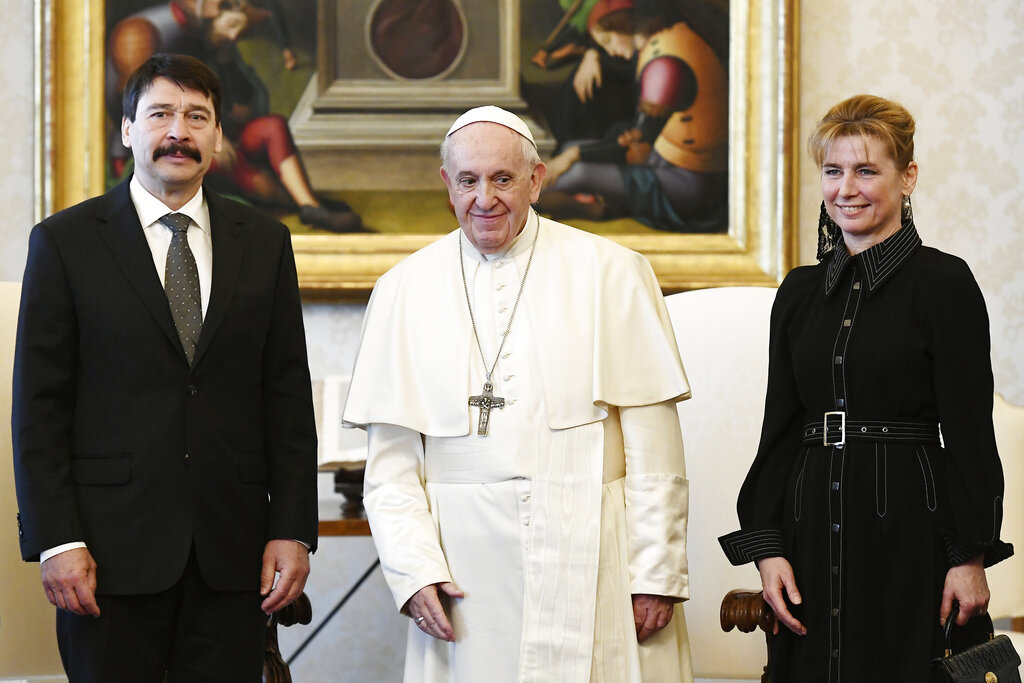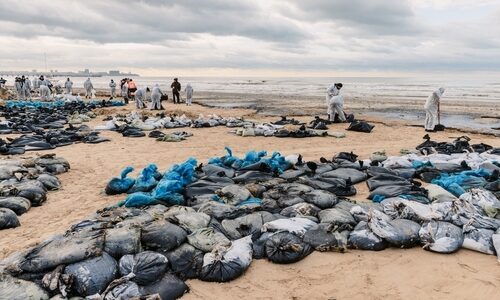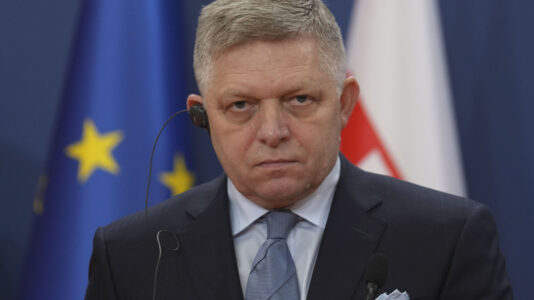The original interview in Magyar Nemzet can be viewed in its entirety here.
Anita Herczegh, the chairwoman of the board of trustees of the Regőczi István Foundation, established to help Covid orphans, spoke to Magyar Nemzet about the extraordinary stories she has experienced during the activities of her organization. The wife of former President János Áder said that their mission started with support for 500 families, and currently the number of Covid orphans supported by the foundation is around 1,200.
The Regőczi Foundation was established in May 2021 with the aim of providing long-term and personalized care to children and young people who have lost one or both parents as a result of the coronavirus pandemic. How many beneficiaries does the foundation currently have?
In the first year, we supported nearly 500 families and more than 800 children, and later this number increased, at one time it exceeded 1,600. Currently, the number of Covid orphans supported by the Regőczi Foundation is 1,200. The reason for the decrease is that many have completed their studies in recent years and are already working. The foundation supports orphans until the age of 18, but if the person concerned is pursuing full-time studies, be it university or any professional training, they can count on us until the end of their studies.
How old is the youngest child?
Two years ago, in 2022, three more newborns were born who were already half-orphans at the time of their birth, since their father was not alive. There was a mother who realized that she was expecting a baby during her husband’s funeral. But there were also many pregnant mothers who could not save their child, except by cesarean section. These children have been raised by their fathers since birth. There are about 50 of them who were no more than one year old when they became half-orphans. (…) The most shocking story is perhaps that of the children who were already orphans before Covid, so their grandparents raised them, but their grandmother and grandfather also died in the epidemic. There are also four children we support whose mother died of illness, two years later their father also died, and then Covid took away the grandparents who were assigned as guardians. So these four children have been orphaned three times. Despite the series of tragedies, two of them are now adults. One of them is a university student who regularly participates in our events, and it seems that he was able to overcome the hardships and losses so far with a healthy spirit, which is almost incomprehensible to me.
What kind of support can the foundation provide to these children with difficult fates, whether it be spiritual, financial or intellectual help?
We embarked on this mission with great momentum in 2021. We undertook to provide personalized support to children until they reach adulthood or complete their studies. We obviously cannot replace a deceased mother or father, but we try to provide everything that a parent could give. In the first year, we helped families with a one-time, larger amount of emergency aid. Many had difficulty paying the funeral costs, in some cases the joint account was blocked until the probate procedure was completed, in others the mother was poor and had no salary.
The following year, we established a monthly support system, depending on the need and the number of children. We try to assess the situation of families correctly in order to distribute the donations we receive as fairly as possible. Based on the data, we classify families into different categories, but we support all Covid orphans who contact us to some extent. Those in the most difficult situation receive regular monthly support, but some only receive it four times a year: before Christmas, at the end of the heating season, during the summer break period, and before the start of school.
It is also possible to request extraordinary assistance, for example, if the boiler breaks down, if glasses or braces are needed, or even for the travel costs of a child who has an athletic competition abroad. In such cases, they write us an application, which the board of trustees makes a decision on. I feel that we handle these needs with sufficient flexibility, but we strive to establish a fair support system, as we are responsible to our donors.
Is there funding for the foundation’s operations?
The amount with which we started helping Covid orphans at the time has, of course, already run out. Since the foundation will certainly have a task for 20 years, it is important to find long-term supporters. In addition to regular financial assistance, we also try to solve difficulties such as processing grief. We have experienced with many children and widows that they need a psychologist or mental health professional. A psychologist now charges HUF 30,000 to HUF 40,000 for a one-hour session, and it takes many sessions to process grief. We also organize grief-processing group therapies, because if the widow has not yet been able to process the loss, it will also affect the child. The fact that they were able to get out of their everyday lives a little, were with people who are in a similar situation, talked to people who have been through the same thing, and they have been through the same thing. Since then, they have kept in touch with each other and helped each other. We don’t regret spending money for this, because without it there is no way forward, they cannot focus on the future. Without it, it could happen that the children cannot process their own loss, because they have to support and comfort a devastated mother.
We have many supporters who offer vacation and camping opportunities in different parts of the country, as well as in “Upper Hungary” (formerly part of the Kingdom of Hungary, now in Slovakia) and Transylvania (Romania). A bus company helps transport families at a discount. We receive state and local government assistance, there are small entrepreneurs and associations that we can count on. We also have a lawyer who provides legal assistance. We often receive material donations: toys, honey, hand-knitted scarves, which we distribute at our events. It is a good feeling that at that time the whole country mobilized for orphaned children.
We were able to go to the Hungarian State Opera House for the third time for the dress rehearsal of The Nutcracker, and the Budapest Grand Circus also gives us tickets free of charge. The Rearticon Applied Arts Association offered a workshop for the Regőczi orphans for the weekend before Christmas, where they could make gifts together, be together, and relax. There were also Christmas concert offerings, so it’s gratifying that more people thought of us during this period as well.
Do you have personal contact with the families?
Of course, I can’t visit all 800 families, but when I’m in the countryside, I try to go to our beneficiaries. I’ve already visited dozens of children. Even though we ask for the children’s data and see that, personal contact gives a much clearer picture. I also met a mother who is now battling cancer as a Covid widow. I got to know the 6-year-old girl who lost both her parents in the epidemic in one day and is now being raised by her grandparents, and the 7-year-old boy who lost his mother and whose father was never present in his life.
The two tragedies seem more or less the same. I visited both families. The girl is being raised by strong grandparents with a good financial background. The grandparents of the little boy are older; the grandfather has survived two heart attacks, and they live in very modest circumstances. The personal meeting revealed that in this case the financial need is much greater than I would have thought based on the data provided.
Are there any children who, due to lack of relatives, ended up in foster care or an institution?
As far as I know, almost all the children were placed with relatives. I know of two orphans who were taken in by the family of their classmate. It was not a question for the parents to take on the guardianship of the children. The foundation, of course, also provides support in such cases.
In addition to the foundation, you also do missionary work for the Hungarian Maltese Charity Service and Catholic Caritas. How are you able to perform so many tasks?
When my husband’s term as president of the republic ended, I had to think carefully about whether I would return to the judicial career or continue the charitable work that I had done intensively for ten years before. I can be replaced as a judge, but the Regőczi Foundation is a personal commitment and cannot be transferred.
The Hungarian Maltese Charity and Catholic Caritas also asked me to be a good service ambassador, and I undertook these tasks while actively participating in everyday work. Contributing to collections, medical missions, homeless care, and improving the living conditions of people with disabilities is a joyful activity for me.
I have been a blood donor since I was a university student, and I also regularly try to draw attention to the importance of this. I have also been a hospice volunteer for two years. I previously visited all the hospices in the country, which had a great impact on me. We don’t like to face death, we prefer to turn our heads away. However, I think we should talk about it and even do something about it, instead of thinking about our own comfort.
During my volunteer work, I realized that I am stronger than I thought. At first, you don’t even know if you will be able to handle it. If we can make someone feel better once in a while by just giving them a drink, adjusting their pillow or talking to them, we may have already gained a few more pleasant minutes for them, which is the most we can give when there is no hope of recovery.
You have encountered countless painful life situations in recent years, whether it’s Covid orphans, Ukrainian refugees, or terminally ill patients. How can you process all this, become stronger, and continue the next day with the same strength?
The many dramas I encounter also give me at least as many successes and beautiful stories. When I see a 20-year-old young man – who has already experienced as many tragedies as three people combined – thinking about how he will help others, it warms my soul. There are countless people who have been volunteering silently for years, decades, without expecting gratitude or thanks, whom we don’t even know about.
Charitable work reevaluates things in a person, what is really important and what is not. Overall, I have had many more positive experiences, and fortunately, I have met many more good people.
“What’s your best story?”
There is a Covid-widowed mother with three children, and a Covid-widowed father also with three children. The latter also lost his pregnant wife, but fortunately the baby was saved. They were both in their thirties when they became widows. Life brought them together, they started to correspond, talk, and meet. Then, they fell in love.
After the six children met, the mother said that the children were sorry that the six of them were not siblings. Then, love turned into marriage, and since then they have had a child together, so there are seven children living in one family.
And we continue to provide assistance to the six orphaned children, because our basic principle is that even if a new relationship or marriage occurs, we will not leave Covid orphans without support.






